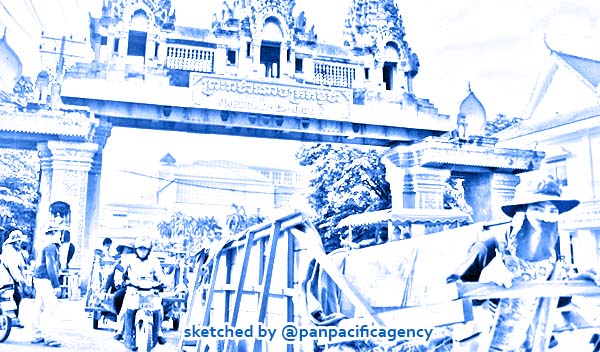Economic pressure for Cambodia and Thailand to reopen borders

Goods transportation at Battambang checkpoints shared border with Thailand’s Sakeo province has now resumed operations, People travel through a Cambodia-Thai border before the COVID-19 outbreak. KT/Ven Rathavong. Sketched by the Pan Pacific Agency.
PHNOM PENH, Nov 4, 2020, Khmer Times. A current labour shortage in Thailand coupled with the economic fallout of widespread flooding in Cambodia is putting pressure on authorities to reopen borders to migrant workers, Khmer Times reported.
The borders between Cambodia and Thailand were shut in March because of concerns that cross-border migration would increase the risk of spreading COVID-19.
The World Bank has said that approximately 120,000 migrant workers returned from Thailand since the pandemic began, which is estimated to host more than a million Cambodian workers in mostly low-skilled occupations, many of whom are undocumented.
The exodus has caused many farmers in Thailand’s East to complain of worker shortages to help with fruit harvesting this season, while many farmers in Cambodia’s West have had their crops devastated from flooding last month and have debts to repay local lenders, forcing them to seek income from elsewhere.
Thai authorities have been planning a trial group of 500 Cambodian migrants to work in a fruit warehouse setting up a permanent border for the workers in the Pong Nam Ron district of Thailand which links with Cambodia’s Battambang province.
According to local reports, the screening processes, medical check-ups and quarantine would cost around $193 per person but dropped to only $86.76 if they are quarantined in the warehouse.
Khmer Times was told by villagers and commune officials in Banteay Meanchey province during the pandemic that despite the official border closures many are now paying agents to facilitate the border crossing.
“Now the borders are closed my husband, via a cross-border facilitator, has to pay $102, before he can go illegally into Thailand where he can earn $12.50 per day in the construction sector,” a local villager said.
Last week, Prime Minister Hun Sen warned Cambodian’s to try to find work within the country and avoid being deceived by brokers who illegally send them to Thailand for work amid the COVID-19 pandemic.
“Please don’t be deceived by a broker. We have to work in our country. Some people have been deceived when going to Thailand via brokers. Sometimes, they have been placed in prison and sometimes they have been deported,” he said.
The Centre for the Alliance of Labour and Human Rights has advised Cambodian workers to wait until formal channels for migration, such as the latest plan for 500 workers, are reopened before heading back to Thailand.
“We do not encourage any method against or outside the existing mechanisms. We are worried that there isn’t a support [system] and there will be labour exploitation,” they said, adding the agricultural sectors were more appropriate for the return of Cambodian workers amid ongoing COVID-19 concerns, if they would be working in open spaces, especially compared with industrial work. “The important thing is for the state to guarantee their well-being. We don’t want to see COVID-19 used as a cover to exploit the labour force or to violate labour rights,” they added.
According to a study by the International Organization for Migration conducted on Cambodian workers in Thailand last year, interviewees reported an average remittance of around $1,225 per year and said that funds are crucial in maintaining or improving the living conditions of their families back in Cambodia.
They also reported other benefits from migration, including increased savings and developing new skills, which they expected would help them to find better jobs with higher wages both in Thailand and Cambodia.